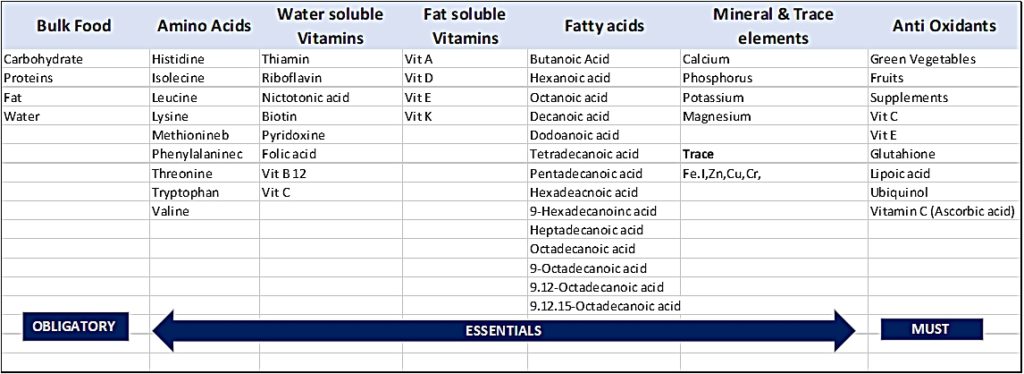
Why eating right Food is Good Habit |Good Foods
We are what we eat |Eating right food is for long innings
The living organisms are unique in that they are self-replicating, self-adjusting, self-repairing, and self-evolving systems. We are what we eat. Daily what we eat makes our body, robust or fragile. So it is obvious that we have to pay proper attention to what we eat. For this, we have to fully understand and appreciate what our body daily needs are. You must know whether or not you are providing in your daily diet all that you need. Eat right and stay healthy and fit.
More often than not our health problems originate because we have not given proper attention to what we eat. Often the question is asked are we living to eat or we are eating to live. We often blame our genes that we inherited from our parents. None of us have any choice of choosing our parents. Like it or not, we have to live with it. Accept it as our fate. No one is born with perfect set of all healthy genes. There will be some defect somewhere which might crop up and start affecting our health sooner or later. If the defect happens to be in some vital genes, one can be born within born errors that become apparent almost immediately. If detected early and attended early, for some, it may be possible to control and reduce the sufferings . But there are many so-called diseases of civilization that do not become apparent immediately but show up later in life and become a chronic degenerative disease.
All of us know that these types of health problems that manifest as chronic diseases, such as heart disease, diabetes, arthritis, mental illness, and cancer because of sudden drastic lifestyle changes, are now surfacing sooner than later. Again one can blame our genes that we inherited from our parents. Although we can do nothing about the imperfect genes that we may have inherited, we have to blame ourselves for having precipitated the disease early, mostly due to unhealthy diet and partly due to lifestyle. It is therefore now these degenerative diseases are being regarded as lifestyle disease.
Modern stressful lifestyle, junk food, pollutants, tobacco, overuse of drugs, alcohol, along with total negligence to the actual nutritional needs of the body, all cumulatively contribute to the early occurrence and increase in severity of degenerative diseases. It is our wrong lifestyle, bad eating habits that make us vulnerable to get the genetically predisposed disease, early and more aggressively.
We must understand and appreciate that genes do not function on their own. Genes need basic ingredients, essential nutrients, incessantly supplied from our food, to do their assigned job properly. Genes can work efficiently, only if we supply these basic ingredients adequately, daily in our food, only then they are capable of giving us a healthy body.
Our body is dynamic; it continuously renews itself from the food that we eat. Different parts of the body are programmed by the genes to be renewed at different rates. Old cells die by a natural process called apoptosis and are replaced by new cells. This creation of new cells happens with the help of ingredients provided by food constituents.
Old cells must die as they are no longer able to carry out their functions efficiently and have to be replaced by new cells. So it becomes apparent that without the continuous supply of proper and complete nutrients through our food, body cannot create optimally functional new healthy cells in each and every part of our body. So it is clear that perfect understanding of body’s needs and their adequate supply through food is basic to our good health. Improper and incomplete nutrients in our food will result in creation of unhealthy new cells, ultimately resulting in unhealthy body.
Conversely, if one gives good food, complete in all respects in quantity and quality, we can transform our body from ill health to good health.
Important ingredients needed in food for good health

Essential Micronutrients in Human Nutrition
Human food must contain six categories of ingredients, water, proteins, carbohydrates, fats, vitamins, and minerals. Although fibre cannot be regarded as required food ingredient, but is extremely important in prevention of diseases as it is helps in digestion and absorption and the bioavailability of micronutrients, about 60 % of the human body is composed of water. Nearly all the life-sustaining chemical reactions are carried out in aqueous medium.
All the three bulk foods, namely proteins, carbohydrates, and fat can be sources of caloric energy. Carbohydrates and proteins provide four calories per gram. Carbohydrates are primary source of energy, and proteins and fat are used sparingly as source of energy or under emergency. Fat provides nine calories per gram.
The human body is capable of manufacturing saturated and monosaturated fats, but not the essential omega-3 and omega-6 polyunsaturated fat. Given enough calories, human body is capable of manufacturing thousands of chemical compounds from the food ingredients called metabolites by a process called metabolism to sustain life.
However, unlike plants, as mentioned above, human body is incapable of synthesizing several nutrients, and hence they are called essential. These are some 40 micronutrients .
Why a Man requires food and Plants manufactures it’s all Food
To study man a huge Project was initiated i.e. Human genome (the full complement of genetic information that an organism inherits from its parents, especially the set of chromosomes and the genes they carry) Project.
In the project on which very huge amount of money was spent to get the nucleotide sequence of all 23 pairs of human chromosomes. The project was completed ahead of time. When the project started, it was thought that man is the most complex organism on the planet and possibly has more than hundred thousand genes.
But at the end of the project, it became evident that man has less than twenty thousand genes . This is very much off the expected mark, particularly when even the simple-looking rice plant has forty-five thousand genes , twice that of human genome. Although this finding seems paradoxical, it is not surprising if we recognize the fact that man is crippled in evolution.
Now this seemingly paradoxical situation can be explained by the difference in synthetic capabilities of rice versus man.Rice has ability to synthesize all its needs, namely all vitamins, all 20 amino acids, and the two essential omega-3 and omega-6 fatty acids from carbon dioxide from the air, minerals, and water from the soil with the help of energy obtained from sunlight.
However, man is not endowed with this extraordinary synthetic power. He has lost them during evolution. Man is not provided with the genes to make these nutrients. He is crippled in evolution. Therefore, he needs to obtain these nutrients, which are regarded as essential nutrients, readymade, daily from the food.
However, we have been provided with the brain instead, with the ability to think. Now that we know that we are deprived of these genes and have lost the genes and as we have no ability to synthesize these nutrients, it should be our endeavor to ensure that our daily diet has the quality proteins that can provide all the essential amino acids adequately, all the vitamins, minerals, and also two essential omega-3 and omega-6 fatty acids.
Only if we take care of these, we can have healthy body and any ill health that arises out of this negligence or ignorance may possibly be managed to some extent, for some time, by medicines, but cannot be corrected. Nutrition is vital and primary for good health.
Types of Fat ,Sources and effect
| Type of fat | Dietary sources | Effect of Cholesterol | Frequency of Usage |
| Trans Fat | Hydrogenated or Partially Hydrogenated Oil Vegetable shortenings, stick margarine, deep fried foods, some fast foods and snack foods (i.e., cookies and crackers) | Raises LDL | Less Often |
| Saturated fat | Red meat, the skin from chicken and other birds, butter, whole milk and milk products (i.e., cheese and ice cream). Tropical oils such as palm and coconut oils, cocoa butter, coconuts and coconut milk. | Raises LDL | Less often |
| Monounsaturated fat | Avocados, olives, certain nuts | Lowers LDL when substituted for saturated fat | More often |
| Polyunsaturated Fat (includes Omega 3 and Omega 6 Fatty acids ) | Plant oils like corn, sunflower, and safflower(includes omega-3 Fish (especially salmon, trout, and herring) Flaxseed oil | Lowers LDL when substituted for saturated fat | More often |